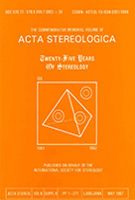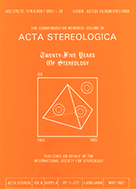- Startpagina tijdschrift
- Volume 4 (1985)
- Number 2 - Proceedings of the fourth European symp...
- On the use of automatic image analysis in the demonstration of transmitter identified nerve cell clusters in the central nervous system
sinds 05 december 2013 :
Weergave(s): 378 (1 ULiège)
Download(s): 69 (1 ULiège)
Ann Marie
Janson, Luigi F.
Agnati, Kjell
Fuxe, Isabella
Zini & Anders
Härfstrand On the use of automatic image analysis in the demonstration of transmitter identified nerve cell clusters in the central nervous system
(Volume 4 (1985) — Number 2 - Proceedings of the fourth European symposium for stereology - Dec. 1985)
Article
Documenten bij dit artikel
Bijlagen
Abstract
By means of the "close" function of the IBAS image analyzer it has been possible to determine if the transmitter-identified nerve cell bodies in an area are scattered or form clusters, since closely packed nerve cell bodies will unite by this procedure. The cell density of the cluster can be evaluated by considering the ratio between the area of its nerve cell profiles and the field area of the entire cluster. By this procedure a cluster of adrenaline nerve cell bodies have been discovered in the ventrolateral rostral reticular formation of the medulla oblongata belonging to the lateral part of adrenaline group C1.
Keywords : brain, clusters, image analysis, nerve cell bodies, nerve cell clusters
Om dit artikel te citeren:
Ann Marie Janson, Luigi F. Agnati, Kjell Fuxe, Isabella Zini & Anders Härfstrand, «On the use of automatic image analysis in the demonstration of transmitter identified nerve cell clusters in the central nervous system», Acta Stereologica [En ligne], Volume 4 (1985), Number 2 - Proceedings of the fourth European symposium for stereology - Dec. 1985, 171-174 URL : https://popups.uliege.be/0351-580x/index.php?id=3145.
Department of Histology, Karolinska Institutet, Stockholm, Sweden
Department of Human Physiology, University of Modena, Modena, Italy
Department of Histology, Karolinska Institutet, Stockholm, Sweden
Department of Human Physiology, University of Modena, Modena, Italy
Department of Histology, Karolinska Institutet, Stockholm, Sweden







